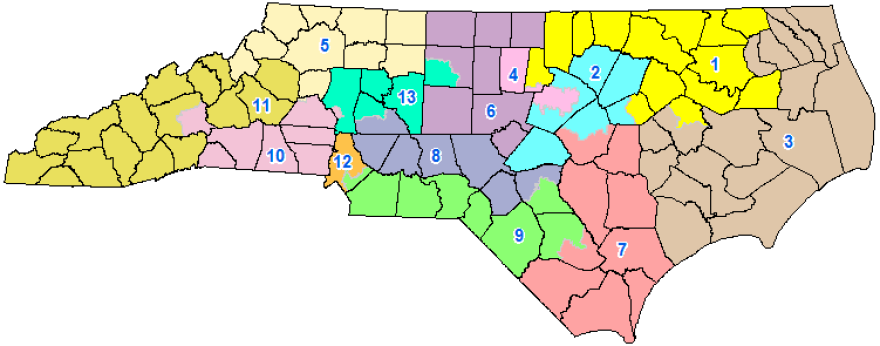In challenging North Carolina’s congressional map, Common Cause and the League of Women Voters pinned their hopes on what North Carolina state Rep. David Lewis said three years ago.
He said the Republican-drawn map was a partisan gerrymander, and that was OK.
“I propose that we draw the maps to give a partisan advantage to 10 Republicans and three Democrats because I do not believe it’s possible to draw a map with 11 Republicans and two Democrats,” Lewis said then.
Chief Justice John Roberts wrote in his majority opinion that he doesn’t condone what the Republicans did in North Carolina, but that it’s “beyond the reach of federal courts.”
[Analysis: What Comes Next After Supreme Court Gerrymandering Decision]
For his part, Lewis held a press conference to say the ruling vindicates him.
“The framers gave this responsibility, they vested this responsibility, in the state legislature,” Lewis said Thursday. “It is time for the state Democratic Party, Common Cause, and other aligned leftist groups to stop wasting taxpayer money on lawsuits and bring this conversation back to the legislature.”
Justice Elana Kagan, writing the minority opinion, wrote that “partisan gerrymanders debased and dishonored our democracy, turning upside down the core American idea that all governmental power derives from the people.”
[What The Supreme Court Decision On Gerrymandering Means For NC]
Attorney Allison Riggs, who argued on behalf of the League of Women Voters, said Roberts’ statement that the court doesn’t condone the North Carolina map means little.
“To say that this won’t be read as condoning excessive partisan gerrymandering doesn’t accord with the reality of what we find on the ground, which is extreme partisans celebrating this decision as a rubber stamping what they have been doing for so many decades,” Riggs said.

North Carolina’s map packs Democrats into three overwhelmingly Democratic districts, including the 12th district, which covers most of Mecklenburg County. The map also splits some Democratic cities, such as Asheville, Fayetteville and Greensboro, diluting Democratic voters into Republican districts.
But Roberts said the court shouldn’t decide when a map goes too far.
He wrote that if the courts policed political gerrymandering, the courts would stray close to proportional representation. That means that if a political party received 40% of the vote, it should have 40% of the legislative seats. But Roberts wrote the framers of the Constitution did not want proportional representation.
Roberts also said that creating 50-50 districts could put the minority party at a disadvantage. In the event of a wave election, for example, he said the smaller party could be completely wiped out.
He also said that states are already addressing partisan gerrymandering through independent commissions.
Former state Sen. Bob Rucho of Mecklenburg County, a defendant in the lawsuit, said he opposes those commissions. He says they aren’t accountable to voters.
“Is there a role for independent redistricting? No because the U.S. Supreme Court has validated the fact the legislature is the one that makes those decisions,” Rucho said.
The ruling comes as states will draw new congressional maps after the 2020 Census.
But Common Cause says it’s not giving up. It has a pending lawsuit challenging North Carolina’s state legislative map that will likely be decided by the state Supreme Court, where Democrats have a majority.
If that lawsuit is successful, it could force the state to remake its legislative map, giving Democrats a chance to control the General Assembly and draw the Congressional maps next decade.
“What we know is our democracy depends on us picking ourselves up, brushing ourselves off and fighting again,” Riggs said. “And we will do that, the League will do that, Common Cause will do that.”
The trial over the state legislative map is scheduled to begin July 15 in Raleigh.





